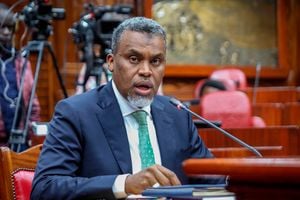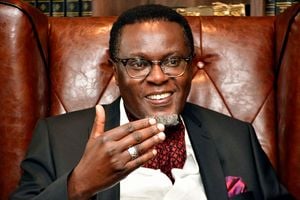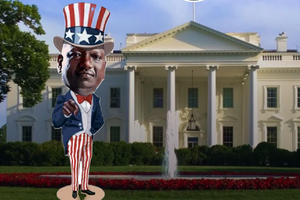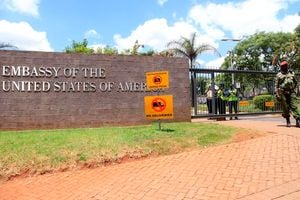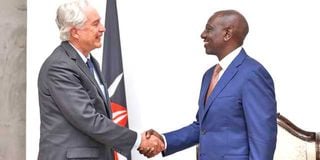
US Central Intelligence Agency (CIA) Director William Burns meets President William Ruto at State House, Nairobi, on January 15, 2024.
With the Horn of Africa threatening to become a powder keg, the US Central Intelligence Agency (CIA) chief William Burns flew into East Africa for a meeting with close allies.
While the details of his meetings with President William Ruto were not made public, the CIA director also flew to Somalia, which is at the centre of a diplomatic crisis with Ethiopia, and held talks with Somalia President Hassan Sheikh Mohamud.
The State House meeting on Monday elicited much speculation with the government mum on the issues raised during the meeting. Why the CIA boss had to fly in instead of passing any message through US ambassador to Kenya Meg Whitman or the agency’s chief in Nairobi triggered further speculation.
However, sources said the high-level meeting, which included ambassador Whitman and Kenya's intelligence apparatus led by National Intelligence Service boss Noordin Haji, discussed critical security issues in the Eastern Africa region.
A high-ranking source privy to details of the meeting told the Sunday Nation that security cooperation and the fight against terrorism dominated discussions.
The ongoing war in Sudan, the frosty relations between Somalia and Ethiopia as well as the impact of the falling-out in Democratic Republic of Congo’s presidential election.
In Mogadishu, President Hassan said they discussed regional issues of mutual interest and enhancing Somalia-US strategic partnership in critical areas, including the fight against international terrorists, and promoting regional stability. The US believes that its exit from Somalia in December 2020 allowed al-Shabaab, one of Al-Qaeda’s most powerful global affiliates, to grow in size and strength.
This is what prompted the deployment of about 500 US service members to Somalia last year to support the government’s fight against al-Shabaab. “Our renewed presence is an effort to stabilise the Somali government and train their forces after our departure in December 2020,” Gen Michael E. Langley, the commander of US Africa Command, said during a US Senate Committee hearing in March last year.
When he took the position, Burns, previously a diplomat, lamented: “We don’t pay enough attention to the continent of Africa as we should.” The timing of the visit coincided with the fifth anniversary of the Dusit D2 terror attack in Nairobi in which 22 people were killed, including an American citizen in 2019. The attack led to the establishment of the first Joint Terrorism Task Force (JTTF) in Nairobi the following year, the first multi-agency counterterrorism investigative force outside the US with the mandate of leading countering terrorism efforts through sharing intelligence in the larger East Africa and the Horn of Africa region.
The initial Kenyan team that was seconded to the force comprised 42 detectives and intelligence officers who were taken through training by the Federal Bureau of Investigations and Counter Terrorism Bureau’s officials at the FBI academy in Quantico, Virginia.
While the US has been focusing on the rim of the Indian Ocean as an area of strategic interest, the continued presence of borderless non-state actors such as al-Shabaab has complicated its desires.
David Monda, a professor of political science at City University of New York, said with Kenya as an anchor state and close ally of the US in the Horn of Africa, the country is vital in intelligence collection, data analysis, covert action, counterintelligence, and pre-emptive strikes against common threats.
“The high-level talks and the attendees further re-emphasise the meetings' importance. The discussions likely centred on intelligence and national security concerns both in Kenya, the Horn of Africa and the Middle East,” he told the Sunday Nation.
United States International University International Relations lecturer, Prof Macharia Munene, added: “The issues could have been communicated through Burn's counterpart in Kenya, but it was so sensitive that the CIA Director had to deliver it himself. It is not a diplomatic assignment. The effect (of what was communicated) might be felt within two or so months.”

US Ambassador Meg Whitman, Kenyan President Willian Ruto, Kenya Foreign and Diaspora Affairs CS Alfred Mutua and US Senator Chris Coons.
The Horn of Africa and East Africa has become complex. Kenya, which hosts the largest CIA station in Africa, is exposed – and has been at loggerheads with its neighbours and has been made worse by political indecisions. Of late, it has had a tiff with Uganda over the oil pipeline, Tanzania over various issues, Somalia over the opening of a Consulate in Hargeisa, and is regarded as America's ‘errand boy’ in the region. More so, critics point out that Kenya’s democracy is sliding backwards – though that does not seem to bother the US diplomats in Nairobi.
Crises
Also among Burns’ concerns, according to our sources, is the civil war in Sudan and the emerging crisis between Ethiopia and Somalia, which could divide the region further. Then there is the volatile Democratic Republic of Congo, where the US has interests. Burns has previously expressed his fears that the chaos in Sudan “can spill over and deepen regional insecurity”. He sees Sudan as an “area where I try to stay a sharper focus as I can and our agency does, too”.
The other issue is that though Kenya has been a close US ally, it has also been hosting US adversaries. In July last year, it gave a red-carpet welcome to Iran’s President Ebrahim Raisi as he began a three-country tour.
Of late, Raisi has been critical of the US's continued bombing of Houthi rebels, who have turned their wrath by firing missiles at Israel and attacking ships off Yemen’s coast in the Red Sea. They say the attacks are in solidarity with the Palestinians who are being bombed by Israel within Gaza. On January 12, Iranian Foreign Minister Hossein Amir-Abdollahian praised the Houthi rebels’ for their actions against the Jewish state.
In the early days of the war, Kenya supported Israel unequivocally – which could expose it to militants. But in a recent BBC interview on Friday, Prime Cabinet Secretary Musalia Mudavadi, who is also in charge of the Foreign Affairs ministry, called for an immediate ceasefire in Gaza and asked Israel to end the humanitarian crisis and “catastrophic” loss of life.
Another regional problem is the recent move by Ethiopia to sign a Memorandum of Understanding with Somaliland, the breakaway Somalia province. Initially, Ethiopian Prime Minister, Abiy Ahmed, had told Parliament that the country’s population cannot continue living for long in a geographic prison without access to a port. This was about Ethiopia’s land-locked status – ever since it lost its Red Sea ports after its Eritrea province became an independent nation 30 years ago.

Ethiopian Prime Minister Abiy Ahmed.
While Ethiopia has relied on the Djibouti port, Abiy signed a military port deal with Somaliland on January 1, giving Addis Ababa access to the Red Sea. In return, Somaliland would be given a stake in Ethiopian Airlines and possible recognition of Somaliland as a sovereign state.
The move to recognise Somaliland is drawing mixed feelings in the region. Kenya had also opened a Somaliland consulate in Nairobi, and recently, President Ruto named Abdi Weli Muhamad Hussein as Kenya's Consul General. Somaliland had created a liaison office in Nairobi in 2021.
The White House has expressed misgivings over Ethiopia’s dalliance with Somaliland and the attempts towards recognition of Somaliland. “We’re certainly troubled,” said John Kirby, director of strategic communications for the National Security Council.
He also told Voice of America (VOA) that Washington “was working with partners in the region — including the African Union and the eight-member Intergovernmental Authority on Development trade bloc — to push against the nonbinding memorandum of understanding, which Somalia's government, headquartered in Mogadishu, sees as illegitimate.”
But that will find resistance from some East African nations who regard the US as a bully. President Yoweri Museveni, still an influential figure, has recently been critical of the US. By moving to Kenya and then to Somalia, the CIA director was driven by these emerging security issues. But the most critical is the potential for war over Ethiopia's lease at the Red Sea.
Last July, Abiy flew to Russia for a meeting with President Vladimir Putin. The two countries have military-technical cooperation as one of the critical fields of collaboration. Ethiopia has always sought to become an African naval power, but without a coastline, that was possible.
Abiy, in a fit of nationalism, quotes Ethiopia's 19th Century legend, Ras Alula, who held that Red Sea was Ethiopia’s natural boundary. Somalia has ruled out mediation with Ethiopia unless Abiy Ahmed cancels the port deal with Hargeisa. “There is no space for mediation unless Ethiopia retracts its illegal MoU and reaffirms the sovereignty and territorial integrity of Somalia,” the country’s Foreign Ministry said in a statement posted on its official social media accounts. The other fear is that Al Shabaab could find some new operating space if the tension between Ethiopia gets into war. A troubled horn of Africa creates maritime disasters in the Gulf of Aden.
Another troubled spot is Sudan, an area where the CIA has been watching. Sudan has left the region divided over which of the two combatants should tale power. General Mohamed Hamdan “Hemeti” Dagalo, the Sudan Rapid Support Forces (RSF) and former deputy chairman of the Transitional Sovereignty Council of Sudan, was in South Africa early this month and held discussions with President Cyril Ramaphosa. He also met with Uganda’s President Yoweri Museveni on December 27 before flying to Kenya to meet President Ruto in a series of visits that also included Ethiopia and Djibouti. Sudan army chief Abdel Fattah al-Burhan had previously accused President Ruto of supporting Dagalo and refused to have Ruto chair reconciliation meetings.
The CIA and the French intelligence have for a long time suspected Gen Dagalo of having close ties with Russian mercenary group Wagner who they say are supporting him from their base in Central African Republic (CAR).
At the moment, the African Union has appointed a high-level panel on Sudan headed by top Ghanaian diplomat Mohamed Ibn Chambas. It will include former Ugandan vice president Speciosa Wandira-Kazibwe and Mozambican diplomat Francisco Madeira. With all these complex problems, the CIA director finds himself with a full tray in the region. The dynamics are shifting as regional leaders engage in their cold wars, and ego and hubris inform foreign policy. The US is seeking to control the emerging political chaos. Will it?
- Additional reporting by Collins Omulo, Mary Wambui and Dominic Wabala

